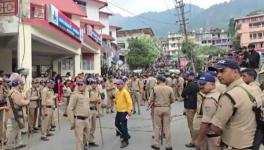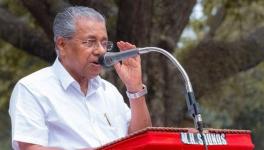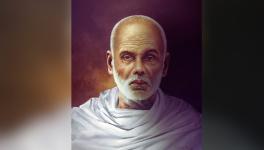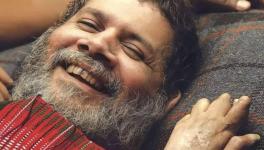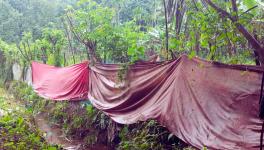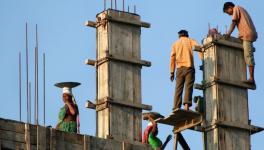Nuns’ Protest in Kerala Exposes the Ruptures Within the Church
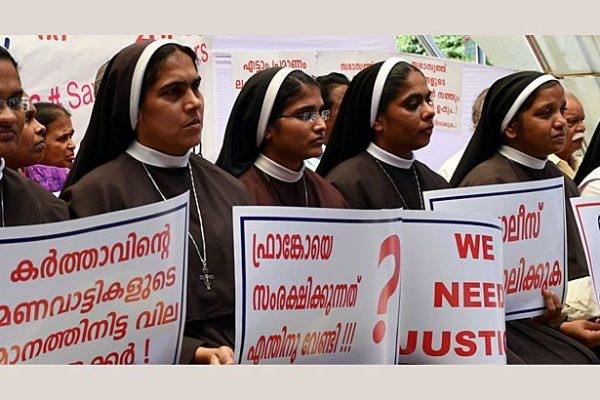
“Our life is in danger”, reads a placard held by a Catholic nun, one among the five, who have joined a protest in Kochi on Saturday demanding the immediate arrest of the bishop accused of raping a nun. The nuns, in a first, have broken ranks with the socially, politically and economically powerful Catholic church in Kerala.
The protest, organised by Save Our Sisters (SOS), entered the fourth day with more and more nuns from different congregations under the church pouring in. SOS consists of members of various Christian reformation organisations including the Joint Christian Council (JCC).
The protesters, as an immediate demand, urged the government to arrest Bishop Franco Mulakkal of Syrian Catholic origin who serves as the bishop of the Latin Catholic Diocese of Jalandhar. On June 27, a nun from the Missionaries of Jesus congregation had filed a complaint that the Jalandhar Bishop Franco Mulakkal had raped her 13 times over a period of two years since May 2014. Following the complaint, the police have taken over the case.
“It has been 75 days since the complaint was filed. Since then, the victim has been called for questioning several times. But Franco was questioned only once. As always, the church authorities have come forward to defend the accused and we suspect there is a conspiracy to protect him,” George Joseph, working president of JCC, told Newsclick accusing the police of inaction.
However, the Kerala High Court, on August 13, was informed by the investigation team that Franco Mulakkal had raped the victim on different occasions from May 6, 2014, to September 23, 2016, at Kuruvilangad in Kottayam district. The court expressed its satisfaction on the investigation and said that there was no lethargy in the investigation as alleged.
While on Tuesday, E. P. Jayarajan, Minister for Industries and Sports, made it clear that the investigation is going on in the right path and there is no external pressure as alleged.
The ongoing protest, headed by nuns and reformists groups within the church, have pointed to the deep ruptures inside Kerala’s Catholic church. Though a number of priests in the state have previously been in the spotlight for sexual assault charges, the church has always managed to suppress the voices within it.
“There are so many congregations in the church and nuns in those congregations have to demur over the church. But, they are afraid to raise their voices against the church. Because they know that if they do so, they have to suffer and we have such experiences in the past,” said sister Teena who has been in the protest venue since its beginning.
Earlier Cases
Here, let us not forgot the case of Sister Abhaya. A Knanaya Catholic nun, Abhaya’s dead body was found on March 27, 1992, in a well in the Pius tenth Convent in Kottayam. The police and crime branch had closed that chapter of the case back then calling it a suicide. Later in 1993, CBI had taken up the case and in 2008, CBI arrested three persons including two priests- Father Thomas Kottoor and Father Jose Poothirikkayil and a nun- sister Stephy. Though they were released on bail a few months later, CBI had submitted the charge sheet in the case with strong pieces of evidence.
In CBI’s reports submitted to the special court in Thiruvananthapuram, according to a witness Prof. Thressyamma, the two priests had illicit relations with the nun. Sister Abhaya had found them in a negotiating position and this was the motive of the murder, the CBI report had claimed.
The ongoing protest
“The first day, there were very few nuns. But yesterday, more and more from different congregations have joined with them. In the upcoming days, more will come out to streets expressing their dissent over such kinds of practices in the church, overcoming the threats of the church,” sister Teena added.
In this case, also, there were significant efforts to suppress the case. “Sister Anupama who has been there with the victim since the beginning is facing life threats. All those sisters who have come out protesting against the church are also under surveillance,” told George Joseph.
Besides, the rape accused Bishop Franco, through a mediator had allegedly offered Rs. 5 crore to the victim to step back from the case. Apart from the money, the victim has been offered a high position- as per her wish- within the church.
The Kerala Catholic Bishops' Council's (KCBC) Stand
The governing authorities of the church, however, stand firm with the accused bishop. “KCBC (Kerala Catholic Bishops’ Council) made it clear that they are with the accused,” said George Joseph. “It should also be included in the interrogations whether the church holds black money or not,” he added.
KCBC, a regional bishops’ council in Kerala, was constituted under the Catholic Bishops’ Conference of India. Churches under KCBC include the Latin Catholic church, Syro-Malabar Catholic church (church of Malabar Syrian Catholics) and Malankara Syrian Catholic church (Syro-Malankara Church). As per the 2011 census, the Catholic church has nearly one million adherents in Kerala.
The victim, earlier, had complained to the higher authorities in the church including Kardinal Mar George Alencherry, the Major Archbishop of the Syro-Malabar Catholic Church. However, Alencherry refused it with a false claim that no such complaints have been received. Following this, the media had publicised a phone conversation between the victim and the bishop Alencherry.
“For nuns, it is not easy to speak against the church and such kinds of attacks. If they do so, of course, like in our society, the church and majority of the adherents of the church will blame the victim,” said Advocate Indulekha Joseph, an activist with Kerala Christian Reformation Movement which is a part of the JCC, while speaking with Newsclick.
She added, “If they oppose the church they have no other options for the rest of their lives. So they are forced to suffer. The followers have always been taught that it is a sin if they question the clergy. So, there is always a fear to question the anomalies within the religious institutions. If one comes out quitting her celibate life, of course, there would be a social boycott.”
The demands of the protest
“Though our immediate demand is the arrest of Franco, we have also been raising certain demands including the implementation of Church Bill, transparency in confession, etc.,” Indulekha said.
The Church Act was proposed by the state law reforms commission chaired by Justice V. R. Krishna Iyer in 2009. The Act, Kerala Church Properties and Institutions Trust Bill, was proposed as a longstanding solution to the confusions and problems arising from the mismanagement of land and properties under the church. However, the Bill is in cold storage now after attracting a severe criticism. Now, there are voices from within the church to implement the Bill.
“The church has a huge amount of money and properties, and it should be democratically managed. You know, if you question the church, then we have to suffer. The church is very powerful in all senses, whether it is political, social or economic,” Indulekha added.
In Kerala, the Catholic Church has always had a strong influence and they have been playing a political role too. In 1958-59, during Vimochana Samaram (liberation struggle) the Catholic Church had joined hands with the Caste-Hindu elites including the Nair Service Society, Congress and Muslim League to overthrow the government of EMS Namboothirippadu- the world’s first democratically elected communist government.
“Apart from this, we have been demanding that there should be a transparency in confession. Recently, we have heard of few cases of blackmailing using confession details,” Indulekha said.
“We demand the practice of mass confession instead of mouth-to-ear confession. Also, there should be special cabins that strictly ensures the privacy of the person who confesses,” Indulekha added.
The protesting nuns are very certain and made it clear that they would be protesting until the arrest of Franco Mulakkal.
Precisely, the ongoing protest is not an isolated one and it points to the lack of transparency, misuse of power and undemocratic nature within the church.
Get the latest reports & analysis with people's perspective on Protests, movements & deep analytical videos, discussions of the current affairs in your Telegram app. Subscribe to NewsClick's Telegram channel & get Real-Time updates on stories, as they get published on our website.










